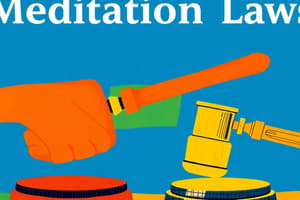Podcast
Questions and Answers
What is one of the primary benefits of mediation as described?
What is one of the primary benefits of mediation as described?
- It requires both parties to have legal representation.
- It fosters a win-win situation for both parties. (correct)
- It can result in a lengthy court process.
- It guarantees a legal verdict.
Which aspect differentiates mediation from litigation?
Which aspect differentiates mediation from litigation?
- Mediation involves a judge making final decisions.
- Mediation is inherently more costly.
- Mediation is less formal than litigation.
- Mediation is a voluntary and structured negotiation process. (correct)
How long does the mediation process typically take according to the Mediation Act, 2023?
How long does the mediation process typically take according to the Mediation Act, 2023?
- 30 days from the dispute initiation.
- No specific timeline is established.
- 90 days from the first appearance.
- 120 days from the first date of appearance before the mediator. (correct)
In mediation, what is primarily focused on during the negotiation process?
In mediation, what is primarily focused on during the negotiation process?
What role does the neutral third party play in mediation?
What role does the neutral third party play in mediation?
In which scenario can a will be overridden by a mediation settlement?
In which scenario can a will be overridden by a mediation settlement?
Under what circumstance can a marriage nullification case be mediated?
Under what circumstance can a marriage nullification case be mediated?
Which type of government disputes is generally unsuitable for mediation?
Which type of government disputes is generally unsuitable for mediation?
What was the legal outcome of the mediation involving the two widows claiming a share of a pension?
What was the legal outcome of the mediation involving the two widows claiming a share of a pension?
Which type of suit is considered unsuitable for mediation due to public interest?
Which type of suit is considered unsuitable for mediation due to public interest?
Flashcards are hidden until you start studying
Study Notes
Speaker Introduction
- Meena Kothari: Senior mediator and trainer with a Bachelor's in Law and Commerce, a Post Graduate Diploma in Journalism, and a B.Ed in Special Education.
- Participating in a project by NALSAR and MCPC to discuss “Appropriate and Inappropriate (Fit/Unfit) Cases for Mediation”.
Presentation Structure
- Introduction to mediation
- Benefits of mediation
- Criteria for mediation
- Appropriate vs. inappropriate cases for mediation
- Relevant judgments
- Conclusion
Definition and Purpose of Mediation
- Mediation is a voluntary, structured negotiation process facilitated by a neutral third party.
- Aims to help parties resolve disputes amicably, focusing on communication and practical solutions.
- Reduces court backlogs, similar to seeking remedies before opting for surgery when ill.
Benefits of Mediation
- Promotes harmonious settlements leading to win-win outcomes for both parties.
- Timely resolution with a 120-day disposal timeline as per the Mediation Act, 2023.
- Cost-effective and forward-focused approach.
- Maintains confidentiality and privacy.
- Encourages creative, flexible solutions based on interests rather than rights.
Examples of Unfit Cases for Mediation
- Probate cases require court involvement; mediation cannot override legal determinations.
- Matrimonial disputes with claims of impotence may be unsuitable for mediation unless mutually agreed for divorce.
- Government-related disputes can be mediated if there is no vested interest from the government.
- Complex cases, such as pension claims involving different marriages, may complicate mediation processes.
Categories of Cases Generally Unsuitable for Mediation
- Representative suits involving public interest (PIL).
- Disputes regarding elected public offices.
- Cases needing court authority after inquiry, such as probate or wills.
- Serious allegations like fraud and forgery are inappropriate for mediation.
- Cases needing court protection, e.g., claims involving minors or mentally challenged individuals.
- Criminal offenses, with exceptions for specific sections of the Negotiable Instruments Act and IPC.
Mediation Act, 2023: Unsuitable Disputes
- Exclusions include:
- Disputes involving minors, deities, and persons with intellectual disabilities.
- Criminal prosecution cases.
- Tax-related disputes.
- Professional registration complaints.
- Disputes affecting third-party rights, except in matrimonial contexts concerning children.
- Exceptions can be made by the government, but agreements are not enforceable as court decrees.
Personal Experiences and Mediator Challenges
- Exchange marriages ('AATA-SAATA') hinder mediation progress due to entrenched community practices.
- Ex-parte divorce situations can complicate future marriages and lead to complicated mediations.
- Large group mediations create crowd control challenges, which can render cases unfit for mediation.
Legislative Background
- Mediation recognized in India through the Industrial Disputes Act, 1947, for mediation in labor disputes.
Landmark Judgments in Mediation
- Salem Advocate Bar Assn.(II) v.Union of India: Accelerated implementation of Section 89 for faster justice.
- Afcons Infrastructure Ltd. v. Cherian Varkey Construction Ltd: Provided guidelines for cases suitable for mediation.
- K. Srinivas Rao v. D.A. Deepa: Allowed mediation referrals in criminal court cases under certain sections.
- Dayawati v. Yogesh Kumar Gosain: Established mediation reference guidelines.
Summary of Key Points
- Understanding mediation, its importance, and suitability criteria is essential.
- Differentiation between appropriate and inappropriate cases reference the Afcons case and Mediation Act, 2023.
- Judicial precedents underscore the evolving landscape of mediation.
Conclusion
- The provided lists of appropriate and inappropriate cases are illustrative, and courts retain discretion to modify them.
Studying That Suits You
Use AI to generate personalized quizzes and flashcards to suit your learning preferences.




